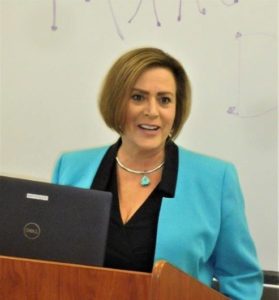“We are happy to provide affordable and accessible opportunities, and we anticipate expanding even further the kinds and types of programs we offer.”
Gov. Doug Ducey signed the legislation in May, which offers state community colleges the option to consider such degree programs.
YC president Lisa Rhine has formed a group that is exploring the possible launching of such degrees. However, the group must first fulfill legislative obligations: (1) the governing board must provide evidence that there is a workforce demand for expanded programs, (2) demonstrate that there is evidence of financial sustainability for such programs, and (3) prove that such programs would not duplicate what the three state universities offer.
Rhine told Quad Cities Business News, “We are excited to be able to consider offering four-year degrees to our communities. At this point, we have received approval from our District Governing Board to begin the process. I have established a working group to research potential fits, establish community needs. This is, I stress, a process. It will take time”
Vice President of Academic Affairs Diane Ryan, Ph.D. will lead the working group. “Once programs are identified, we will need to develop curricula and seek approval from the YC District Governing Board, the Higher Education Learning Commission, and the Department of Education,” said Rhine.
INCREASING ENROLLMENT
Unlike the majority of community college systems in Arizona, where enrollment fell again this fall, Yavapai College showed an enrollment increase over the fall numbers of the past years. In 2019, enrollment was 7,429. In 2020, enrollment dropped to 6,009. But this year, enrollment increased to 7,526 – a significant increase and one of the highest percentage increases of any college in Arizona.
“The enrollment increase seems to document the growing demand for higher education in Yavapai County,” said Rhine.
Only two other community colleges showed increases this past year. Central Arizona College in Coolidge increased from 4,778 in 2020 to 6,073 in 2021. Arizona Western College in Yuma grew from 6,930 in 2020 to 8,368 in 2021.
Nationally, data released by the National Student Clearinghouse and by Thomas Broch, director of the Community College Research Center at Columbia University, show that community colleges across the country were the hardest hit segment of higher education in enrollment.
“COVID disproportionally impacted the populations that community college largely serve,” said Brock, adding that improved and increased marketing helped students realize that community colleges offer real value.
YC administrators agreed. They acknowledged that in some cases, that meant offering courses at significantly reduced tuition, or as is true for some courses at YC, at no tuition cost. It also meant offering classes at non-traditional times and at varying credit levels.
Rhine praised YC faculty and staff for their efforts in recruiting students. “Our personnel have worked hard to recruit and retain students. They have developed programs that give students an opportunity to reach their academic goals that will lead them to living wages and fulfilling careers.”
Rhine said she and her academic colleagues share the philosophy that the college was providing practical and realistic educational opportunities for students on a countywide basis. “We are happy to provide affordable and accessible opportunities, and we anticipate expanding even further the kinds and types of programs we offer.” QCBN
By Ray Newton, QCBN






